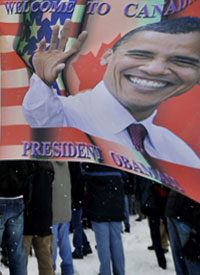
Most of Obama’s discussions, however, took part with Canada’s head of government, Prime Minister Stephen Harper.
While the two leaders touched briefly on issues such as both nations’ roles in Afghanistan, environmental regulations related to Canadian extraction of oil from tar sand, and border security, trade policies dominated their discussions.
During his visit, the U.S. president sought to reassure Canadians that the “Buy American” clause in the $787 billion U.S. economic recovery plan would not threaten free trade. “I provided Prime Minister Harper an assurance that I want to grow trade and not contract it,” Obama said on Ottawa’s Parliament Hill. “I don’t think that there was anything in the recovery package that is adverse to that goal.” AFP reported that the clause originally restricted infrastructure projects outlined in the massive plan to using only U.S.-made materials. However, the limitations were later watered down to comply with U.S. treaty obligations.
In response to Obama’s statement, Harper said: “We expect the United States to adhere to its international obligations. I have every expectation, based on what the president’s told me and what he said publicly many times in the past, that the United States will do just that.” However, in a follow-up comment about the U.S. stimulus program, Harper added a pointed caveat: “If we pursue stimulus packages, the goal of which is only to benefit ourselves … we will deepen the world recession, not solve it.”
One area where Obama tread lightly was the possibility of renegotiating parts of the North American Free Trade Agreement (NAFTA), which includes the United States, Canada, and Mexico. Such revamping of NAFTA was part of Obama’s 2008 election platform.
While indicating that he was still willing to strengthen labor and environmental standards in the pact, he gave no sign that he would push for quick changes. “My hope is that … there’s a way of doing this that is not disruptive to the extraordinarily important trade relationships that exist between the United States and Canada,” he said.
Harper also seemed to address the issue of renegotiating NAFTA cautiously: “We can address some of these concerns, which I understand, without, you know, opening the whole NAFTA and unraveling what is a very complex agreement.”
NAFTA was approved by Congress and signed into law by President Bill Clinton in 1993. At the time, former U.S. Secretary of State Henry Kissinger said that the agreement was “the architecture of a new international system.” Kissinger also labeled NAFTA as “the most creative step toward a new world order since the end of the Cold War."
While NAFTA is generally referred to by its supporters as a “free trade” agreement, Prime Minister Harper just identified it as “a very complex agreement.” Which is an accurate description of the mammoth 1,700-page agreement that created some 33 new international commissions, committees, secretariats, and sub-groups to oversee North American trade.
Since freedom, in its classic sense, is generally the by-product of a minimum of governmental regulation, true free trade would leave entrepreneurs free to conduct business in the best interests of themselves and their customers — governed only by natural market forces. Therefore, a so-called free-trade agreement that is identified as “very complex,” seems like something of an oxymoron.
The North American Free Trade Agreement in reality has little to do with genuine free trade and a great deal to do with economic consolidation and eventual political union. Anyone who wants to see where NAFTA will eventually lead needs only to look at Europe. A series of NAFTA-like agreements (the European Coal and Steel Community, the Common Market, the European Atomic Community and the European Community) eventually led to the formation of the European Union. With its own flag, anthem, Parliament, court, currency, and embassies, the EU is rendering national sovereignty for its member nations a thing of the past.
During the campaign, Obama’s statement that he wanted to renegotiate NAFTA was interpreted by many Americans to mean that he wanted to move away from the agreement. But just the opposite is the case: by reforming NAFTA to include environmental and labor regualtions, the result would strengthening the super-national entity that was intended from the beginning to provide the foundation for a North American Union. Despite the fact that President Obama and Prime Minister Harper both seem reluctant to disturb NAFTA very much at present, future discussion among the leaders of the three North American countries, and where those discussion might lead, bear close watching.



